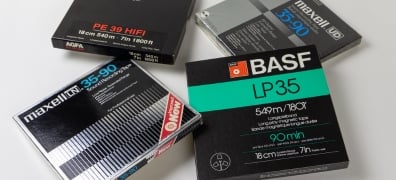Why archiving is important
Dave Reilly, Warner Music's Senior Asset Librarian & Archivist, explores the intriguing link between music preservation and dumbbells in our latest guest blog.

In 2015, I bought a cheap exercise bike, and a couple of dumbbells. I was unfit and needed to establish an exercise routine, but I couldn’t afford the pricey gyms in my neighbourhood, and those further away were too much hassle for me to travel. The bike and weights worked well: the belly receded; job done.
A year later I moved, and found a nice, affordable, local gym. My home exercising days were over - the bike became a clotheshorse and the dumbbells doorstops - but I still kept my equipment. They’d been good to me, and you never know when they could prove useful in future.
Cut to 2020. No one’s allowed outside. For ages. Gyms are shut indefinitely. I still need the exercise (for my mental health as much as physical), but options are limited. Hello, exercise bike! Hello dumbbells! My bedroom gym became a sanctuary for many lockdown months.
It’s important to look after all your assets, even if they don’t serve a purpose at this very moment. When I speak to my friends about my archiving work, most imagine an archive being like an old crypt: a dark basement where I blow dust off each item I want to look at, observing each by candlelight. They think I look after an old space full of old things, that are never to see the light of day again, locked away forever. But the point of storing everything, and storing it well, is that anything is ready to be called on when circumstances change (as they inevitably do). The archives are alive, every asset ready to find a new purpose. Suddenly, that tape you thought you’d never need again is instead the missing key to unlocking a major project you’re working on.
Why keep 2” analogue audio multitrack reels? All the music on those has been released and exists in the world already, right? Why keep all the 16MM and 35MM film reel rushes for a music video? We can find that video on Youtube already…
Technology is constantly improving, evolving at an exponential pace, and at times it can feel like that makes all that came before it redundant, but that couldn’t be further from the truth.
The hot new thing in music is to release records in Dolby Atmos, 7-point surround sound. To do so means mixing each track with these 7 points in mind, rather than the traditional stereo. So now you want to mix the guitars to sound like they’re in front of your face and the drums kicking off behind you, bass to the left, keys to the right, vocals everywhere. This, instead of the traditional everything being left or right. Done right, it sounds absolutely amazing!
For new artists, mix engineers just do this as part of their regular process in the studio. For legacy artists though, you can’t just take the 2-channel stereo wave files already out in the digital world and convert them into 7-channel Atmos. That sounds rubbish. You have to mix the track from the beginning, from the ground up, from those 2” analogue audio multitrack reels you’ve had sitting in your archive all these years.
The hot new thing in video is to restore to 4k resolution, the greatest resolution the world has ever seen. Until the next one. And the one after that. Can you take our previously considered hi-resolution mov video files and press a button to upscale them to 4k or beyond? Sadly no. What you have to do is go back to those original 16MM and 35MM film reel rushes you’ve had sitting in your archive all these years, and edit the video again from scratch. Then you have your video, looking better than it ever has.
These are just two examples, but it’s absolutely true across the board. Those original source assets, those tapes with the original data, the original recording, will always prove invaluable. Because with each technological advance in our media industry, we’ll still have to go back to those assets to make the best of it.
So don’t throw anything away, never think an asset is redundant, that we’ve evolved beyond needing anything that’s come before. As I sit typing this on my laptop, which is sat atop my bike (which has now found a bonus purpose as a way to exercise while busy WFH), I’m repeatedly grateful I didn’t throw it away.
Featured services & solutions
Related resources
View More Resources

